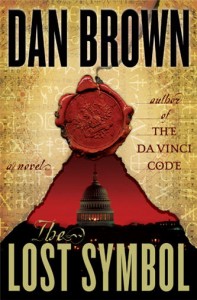 I want to be fair to Dan Brown.
I want to be fair to Dan Brown.
Elitist literary critics say that Brown is not a good writer, and that his stories are bland. I personally think that if you manage to genuinely entertain and awe your audiences, then
you have accomplished something worthy of reading. I also think that “The Da Vinci Code” was nearly an impossible act to follow. People will have all sorts of crazy expectations for your next book that you won’t be able to fulfill. As such, I write this review as fair as I can, trying to assess it on its own merits, but comparisons are inevitable.
The Lost Symbol isn’t a bad book, but it is a letdown. I didn’t like this one for the same reason I didn’t like Angels and Demons as much. Also, Brown doesn’t advance the story at a good pace. A good two-thirds of the book (I’m not exaggerating, I counted the pages) was filled with variations on such a scene:
Character A: Have you heard of X?
Character B (usually Langdon): Yes, but I thought that was just a myth.
Character A shows or tells B something.
Character B reacts with shock.
Then, insert scenes of people walking from one place to another, being chased.
Then, insert the sentence “Suddenly everything made sense.” At least for the next ten pages.
Repeat.
After reading this, I had to wonder whether Brown is a writer on Lost, where people can’t seem to give straight answers, and where scenes never resolve any questions.
Here’s my advice to Dan Brown:
1. Fire your editor. There were some whole passages, even chapters, that served no purpose other than to inflate your book to an unnecessary size. I don’t mind reading big books, but I do mind reading through unnecessary words. Ch. 69, for example, is unnecessary. If your editor didn’t ask you to take it out, then he should be fired. Sorry.
2. We don’t need to know exactly how every character moves from one location to the next, which turn they took, what street they walked across. If it serves the plot, if the geography is important (as it was in Angels and Demons), then fine. Geography was crucial at certain moments in this book, but many times, the passages when you describe how someone moves from one part of a house to another part, what door they opened and closed, all that is boring and tedious.
3. Don’t write your novel like a screenplay. Whether you’ve done it consciously or not, your short chapters read as if you had in mind exactly what camera shots you expect out of an inevitable movie adaptation. Leave that to the screenwriter. If they can adapt a book like “Naked Lunch,” they can surely adapt your book as well. Write your novel as a novel.
4. Be careful of hubris. You’re in a unique and rare position that, I’m sure, many authors dream of: your books will sell millions by default and you will get a multi-million dollar movie deal without question. Good for you! Some authors handle that well (e.g. J.K. Rowling), some don’t (e.g. Stephen King, Michael Crichton). It’s not that the latter are bad writers, but that they are capable of writing some really bad stuff. Having said that, I’m not saying that The Lost Symbol is bad, just that it needs to lose about 100-pages of unnecessary, repetitive scenes. Speaking of Crichton, the reason I stopped reading him is that he became too formulaic. All his books are about a bunch of mismatched experts going to some remote location and something goes wrong. Formula isn’t bad per se. Rowling is formulaic too. Most of her books revolve around the Hogwarts school year, but she puts enough story in there to make it work. You should do more of that.
5. Know what you’re good at. You know your technology, which makes your book authentic. You also know that your readers are likely to go Google
a painting or artist you mentioned and be awed by what you described. That’s great! I bet that also saves you the pain of having to request reprint permissions of artwork and such. Also, since most people don’t know their history, let alone the etymology of words they use everyday, you have literally an endless supply of stories. That’s what you’re good at. I’d say, forget the science stuff. It’s interesting, but, as with Angels and Demons, it’s an awkward fit. I don’t recall there being any modern science in The Da Vinci Code and I was fine with that.
6. Try a recurring character. Langdon is fine, but consider having a character or two that returns in subsequent books. Make them interesting, of course, and don’t make them a love interest.
So, here’s the good news. Dan Brown hasn’t nuked the fridge, at least not for me. Also, now that this book is out in the open, readers are likely to give his next book a much fairer assessment. So, I look forward to reading that, but, I probably won’t be buying it on the first day it’s out.